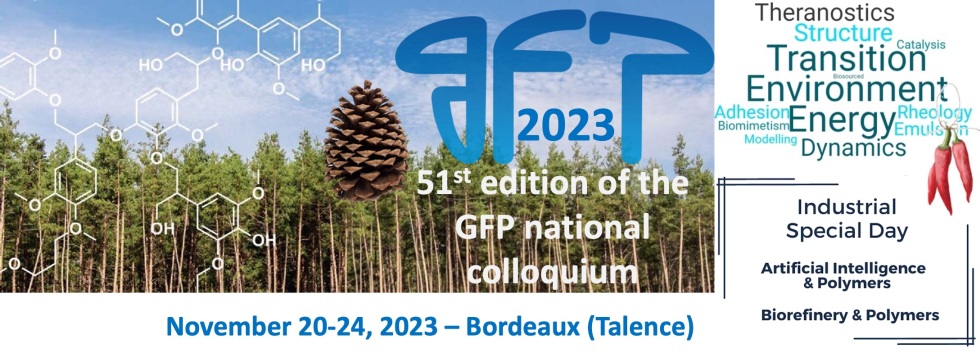1/ Session ‘Polymers and Environmental Transition’
Massively used in various consumer applications such as packaging, textiles, construction, transportation, or electronics, polymers have started to be criticized, sometimes rightly, for their environmental impact, mainly due to plastic pollution. The session will highlight recent developments in the production of environmentally friendly polymers as well as strategies for recycling and managing plastic waste. Research focuses on the use of renewable raw materials (bio-based polymers), the design of biodegradable polymers and the implementation of more efficient collection and recycling systems.
Pr Christophe Detrembleur, Univ Liège
Pr Jérémy Luterbacher, EPFL Lausanne
2/ Session ‘Polymers and Life Sciences’
Polymers are also widely used for biomedical applications, notably for medical devices (prostheses, implants...) and in pharmacology as vectors, improving the biodistribution of active ingredients. In this session, speakers will highlight advances in the design of biomimetic polymers, which mimic the properties of natural biomolecules, and their use in gene therapy, drug delivery, medical imaging and tissue regeneration. Discussions will also focus on advances in polymer biocompatibility and the challenges associated with their use in the human body.
Pr Kawthar Bouchemal, ENSCP Paristech
Pr Rachel Auzély, CERMAV Grenoble
3/ Session ‘Polymers for Energy and Information’
The unique properties of polymers such as high mechanical flexibility, absence of metals and low manufacturing cost have made them indispensable tools in the energy and information fields. Typically, in organic electronics, polymers are used as semiconductors because of their very good charge transport capabilities. In photovoltaics, it is their absorption properties that allow, as in photosynthesis, to convert light energy into electricity. Fluorescent polymers are also used for their ability to absorb photons but also for their collective response to a stimulus, which allows to amplify the fluorescence signal for a better sensitivity. Finally, the binary states that these polymers can adopt have allowed their use as storage memory (hard disks, flash memories etc.). This session aims to highlight these different facets of polymers.
Pr David Mecerreyes, Univ Pays Basque
Dr Ruiz Carretero Amparo, ICS Strasbourg
4/ Session ‘Structure and Dynamics of Polymers’
Since the introduction by P-G. de Gennes of scaling laws describing the structure and molecular dynamics of polymer chains, in solution as well as in the melt or at interfaces, polymer physics has made it possible to link them to the macroscopic properties (mechanical, rheological, thermal, electronic...) of materials. As a result of this development, polymers have become essential in many technological applications (structural polymers, commodity polymers, performance polymers, composite materials, adhesion, surface treatments...). The session will cover all the physical aspects of polymer science, including modeling and structure-function relationship studies, especially those using radiation scattering techniques (X-rays or neutrons) particularly adapted for polymers.
Pr Amélie Banc, LCC Montpellier
Pr Elie Raphael, Gulliver ESPCI
5/ Session ‘Macromolecular Engineering’
Macromolecular engineering is at the heart of polymer science. Polymers are defined not only by their composition and molecular weight, but also by a wide range of other parameters including dispersity, tacticity, the spatial distribution of functionality, block architecture and topology. Recent advances in macromolecular engineering have allowed an unprecedented degree of control over polymer structure, and with it, new applications for polymers. At the end of life, macromolecular engineering is also concerned with the incorporation of cleavable functions to allow degradability or, where possible, upcycling. This session aims to show the development of new techniques for polymer synthesis and post-functionalization.
Dr Sophie Guillaume, ISCR Rennes
Pr Mathias Destarac, IMRCP Toulouse
Industrial Special Day:
6/ Session 'Artificial Intelligence and Polymers'
This session will highlight the foundations of artificial intelligence techniques (automatic learning, deep learning...) applied to the field of materials in general and polymers in particular. The aim will be to introduce the polymer community to the new possibilities offered in terms of predicting chemical reactivity for the design of new macromolecules or understanding supramolecular interactions. The experts will also present the applications of AI in automated characterization, flow polymer synthesis, analysis and simulation of the behavior and macroscopic properties of polymer materials, such as their elastic modulus, electrical or thermal conductivity or permeability.
Dr Matteo Manica, IBM Research Europe - Zürich
Dr Amandine Cuenca, LOF-Solvay
7/ Session 'Biorefinery and Polymers'
Producing polymers from renewable biomass feedstocks instead of petroleum, including lignocellulose and agricultural waste, opens new opportunities for the industry's green transition. Speakers will present innovations in biomass-to-polymer technologies, such as fermentation, pyrolysis, and chemical synthesis, as well as strategies to improve energy efficiency and reduce the environmental footprint of production processes. Discussions will also focus on the prospects for developing the circular economy in the polymer sector, integrating production, consumption and recycling.
Pr Stéphane Grelier, LCPO, Univ. Bordeaux
Pr Jérémy Luterbacher, EPFL Lausanne
Dr Christelle Michaud, Ryam
Dr Laetitia Dupin, L’Oréal


